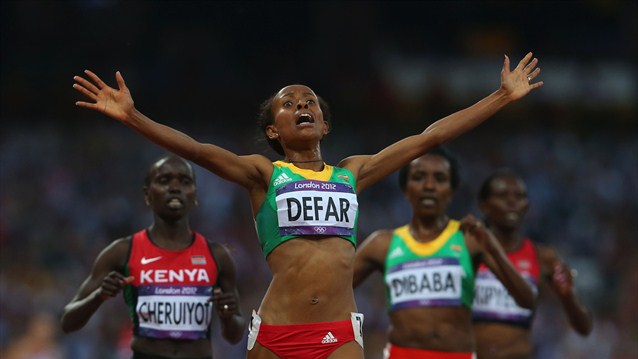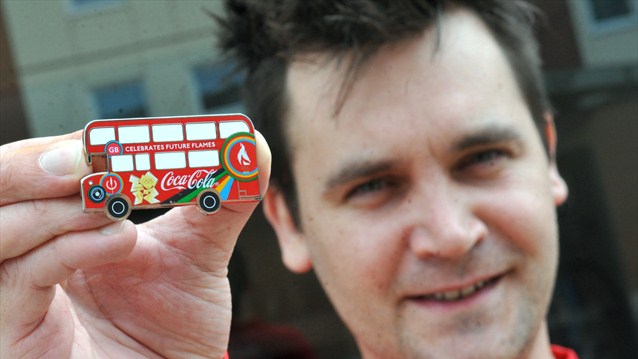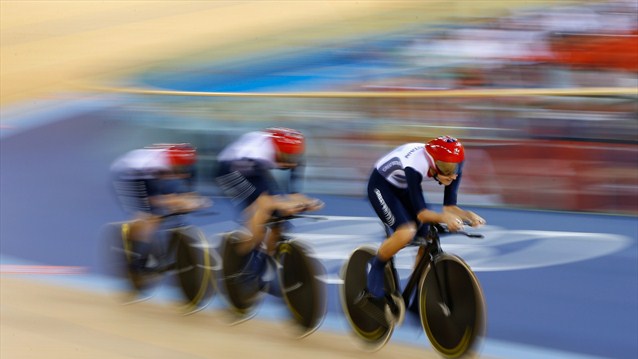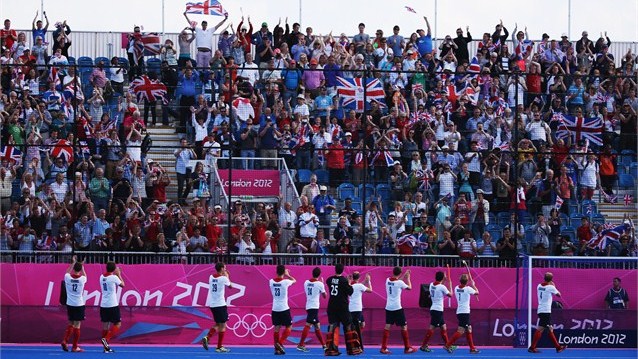Ethiopia's Meseret Defar tonight produced an impressive display to claim gold in the 5000m final.
Defar denied her compatriot Tirunesh Dibaba the chance to add another title to the 10,000m crown she won a week ago, having taken gold in both events in Beijing.
Instead Defar, who won 5000m gold eight years ago in Athens, held off her challengers down the home straight to win in 15:04.25.
Kenya's Vivian Cheruiyot was second, with Dibaba getting the bronze.
Aside from watching the action on the field of play, pin trading is the number one spectator sport at London 2012. This is a fixture at all Olympic and Paralympic Games, and it spans decades and continents. So why not join in?
What is pin trading?
Pin trading is the art of buying or swapping official metal lapel badges produced to commemorate each Olympic and Paralympic Games. It’s also become a social event, where veteran traders look out for familiar faces and new ones make friends – pins are often deemed to be tokens of friendship and gratitude.
The very first Olympic pin badges – actually cardboard disks – were originally designed as colourful badges to identify athletes and officials at the first modern Olympic Games, Athens 1896. Pins were not officially sold as souvenirs until 1912, and by 1984 pin trading centres were drawing big crowds at the Games.
London 2012 pins
There are 2,012 pin designs for London 2012, and each pin tells a story. Examples include limited edition pins of the day for each day of the Games, Olympic countdown pins from 5 years to go all the way to one day to go, the icon series which brings out the best of Britain including post boxes and kilts, and pins of the much-loved London 2012 mascots Wenlock and Mandeville.
Trading tales on the Olympic Park
By Day 7 of the Games, the Coca-Cola Pin Trading Centre on the Olympic Park is already buzzing with activity. Anthony Drexler from London explains how he got into pins: 'I was working at the Athens 2004 Olympic Games and got given a pin; then somehow got another pin. One thing led to another and I now have 13,000 in my collection.'
A visitor from Atlanta recounts: 'My dad gave me my first pin from the Atlanta 1996 Games when I was three years old, and I’ve been collecting ever since. I love collecting the country pins.'
And another transatlantic pin collector, Al Falcao from Canada, says: 'For me it’s not about the pins, it's about the relationships – and the joy is in pursuing rather than owning the pins. I'm giving out pins to children during London 2012 in exchange for a smile.'
Where to trade
Coca-Cola is hosting two official pin trading centres during the London 2012 Games – one on the Olympic Park and one in Hyde Park. If you are not already among the tens of thousands trading their pins, then now is your chance to join in. Start your collection today with the London 2012 Shop
Great Britain's women advanced with a world record in Team Pursuit qualifying on the second day of competition at the London 2012 Olympic Velodrome.
Britain's men were poised to ride-off against perennial rivals Australia for gold and, not to be outdone, the World Championship-winning women's squad of Dani King, Laura Trott and Joanna Rowsell clocked 3:15.669 to go through to tomorrow's first round.
The British trio, who lowered their own best set in April in Melbourne, were set to meet the Canada in what is effectively a semi-final tomorrow.
Canada clocked 3:19.816 to progress in fourth, while second-fastest qualifiers the United States (3:19.406) were set to meet Australia (3:19.719), the third quickest, in the second semi-final.
Great Britain midfielder Ashley Jackson inspired his side to a comfortable 4-1 victory over Pakistan with a performance befitting his stature as one of the world's top players.
The 24-year-old was at the heart of almost everything as the hosts rediscovered their attacking flair, contributing two second-half goals to ensure there was no repeat of their late capitulation against South Africa.
Coach Jason Lee had criticised his players for their lacklustre approach in Wednesday's 2-2 draw - where they conceded two late goals and salvaged a point even later - but there was no repeat this time around.
It took only four minutes for them to make their mark when Jackson's run into the right side of the circle allowed Jonty Clarke to cross and while the diving Iain McKay missed, James Tindall was on hand to convert on his reverse-stick.
Jackson had a penalty corner saved on the line by Rashid Mahmood and while Great Britain could not take advantage when Pakistan were briefly reduced to nine men - confusion reigning as they were apparently punished for having too many players on the field - they gave themselves a cushion just before the interval.
In a superb passage of play, Jackson picked out Nick Catlin in a similar position to where the first goal was created, and when he squared, Clarke had only to take a touch before slotting into an empty net.
Jackson's excellence was eventually rewarded midway through the second half when his low penalty corner flick gave his side the cushion they needed and him his third goal in his last two matches.
The East Grinstead midfielder almost added a second when his shot, destined for the far corner of the goal, was tipped behind by Imran Shah, but it duly arrived when he flicked another penalty corner - high this time - to make it 4-0.
Sohail Abbas maintained his ratio of a goal for every one of his 347 appearances with a late corner of his own but the day belonged to Jackson, the poster boy of Great Britain hockey.




 RSS Feed
RSS Feed